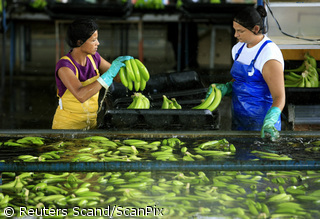The central bank governor is warning that the euro is not the cure for all Poland's ills
Published:
19 January 2005 y., Wednesday
The central bank governor Leszek Balcerowicz is warning that the euro is not the cure for all Poland's ills.
Leszek Balcerowicz believes the government should focus on reforms to yield long-term economic growth, rather than rushing to join the single currency.
"I never said that Poland should enter [the eurozone] at any cost. I said the best strategy is to fulfill conditions for euro entry in a rapid and sustained way," said Balcerowicz, while attending a meeting of central bank governors last week. "The process of EU enlargement was conducive to reforms. The idea of euro entry should be a similar incentive."
Balcerowicz has frequently said that eurozone entry is a political, rather than an economic issue, and that taxes and spending are currently too high for single-currency membership. He also said that tougher reforms were necessary to free Poland from the shackles of long-term high unemployment. In the 1990s, his economic treatments helped Poland recover from the collapse of communism.
"It will pay for Poland to undergo fiscal consolidation," he said. "Unemployment in Poland is not due to over-excessive market-oriented reforms. All of the reasons are structural. There has been some labor market liberalization but I think we need much more decisive action."
Despite his comments, the Civic Platform (PO) party, which is expected to win the next general election, says eurozone entry by 2009 will be a key objective for the party. "Our government will have the strategic goal of adopting the euro by 2008 or 2009. We will do everything to make sure it happens," said Zbigniew Chlebowski, deputy head of the Platform's parliamentary group.
Chlebowski also hinted at the future government's economic policy plans, saying major reform initiatives-such as its flat-tax proposals-would be launched at the start of 2007, not in 2006 as earlier signaled. He also said that limiting the budget deficit in 2006 would be difficult because of the outgoing government's spending promises but that fiscal policy would tighten from 2007.
Šaltinis:
wbj.pl
Copying, publishing, announcing any information from the News.lt portal without written permission of News.lt editorial office is prohibited.
The most popular articles
 The EBRD is increasing the availability of financing to the real economy in Hungary, with a €50 million credit line to CIB Bank, including at least €10 million equivalent denominated in Hungarian Forint.
more »
The EBRD is increasing the availability of financing to the real economy in Hungary, with a €50 million credit line to CIB Bank, including at least €10 million equivalent denominated in Hungarian Forint.
more »
 At the end of March 2010, AB Bank SNORAS deposit portfolio exceeded LTL 5 billion, of which over LTL 3 billion are household deposits.
more »
At the end of March 2010, AB Bank SNORAS deposit portfolio exceeded LTL 5 billion, of which over LTL 3 billion are household deposits.
more »
 In affirmation of Vietnam’s remarkable progress towards Middle Income Country status, the World Bank Board of Directors today approved a second loan for Vietnam from the International Bank of Reconstruction and Development (IBRD).
more »
In affirmation of Vietnam’s remarkable progress towards Middle Income Country status, the World Bank Board of Directors today approved a second loan for Vietnam from the International Bank of Reconstruction and Development (IBRD).
more »
 The World Bank today approved a EUR26 million loan to the Republic of Croatia aimed at further improving the efficiency of Croatia’s justice system − a necessary process in Croatia’s path towards successful European Union accession.
more »
The World Bank today approved a EUR26 million loan to the Republic of Croatia aimed at further improving the efficiency of Croatia’s justice system − a necessary process in Croatia’s path towards successful European Union accession.
more »
 The ACP-EU Joint Parliamentary Assembly asked the European Commission to help EU and ACP banana producers adapt to the new EU-Latin America trade agreement, which is expected to put an end to fifteen years of “banana wars” between the two continents, but has raised concerns for the livelihood of some regions' producers.
more »
The ACP-EU Joint Parliamentary Assembly asked the European Commission to help EU and ACP banana producers adapt to the new EU-Latin America trade agreement, which is expected to put an end to fifteen years of “banana wars” between the two continents, but has raised concerns for the livelihood of some regions' producers.
more »
 As seventeen of Africa’s 53 nations celebrate 50 years of independence in 2010, Africa’s “golden moment has come” and investors around the globe must look to the continent often painted only as risk-prone if they are to capitalize on business opportunities.
more »
As seventeen of Africa’s 53 nations celebrate 50 years of independence in 2010, Africa’s “golden moment has come” and investors around the globe must look to the continent often painted only as risk-prone if they are to capitalize on business opportunities.
more »
 During the ordinary general shareholders’ meeting of AB Bank SNORAS, which took place on 31st March 2010, the bank’s profit distribution was approved.
more »
During the ordinary general shareholders’ meeting of AB Bank SNORAS, which took place on 31st March 2010, the bank’s profit distribution was approved.
more »
 The EU is the world's largest economy, with enough international clout to return to "real capitalism" rather than resign itself to an alien "financial capitalism", concluded MEPs and experts at a public hearing held on Thursday by Parliament's special committee on the crisis.
more »
The EU is the world's largest economy, with enough international clout to return to "real capitalism" rather than resign itself to an alien "financial capitalism", concluded MEPs and experts at a public hearing held on Thursday by Parliament's special committee on the crisis.
more »
 Food quality and labelling are likely to be key issues when the Common Agriculture Policy is overhauled in the coming years.
more »
Food quality and labelling are likely to be key issues when the Common Agriculture Policy is overhauled in the coming years.
more »
 The European Investment Bank (EIB) is lending EUR 250 million to Russian company Enel OGK-5 to finance the upgrading of a gas fired power plant located in Nevinnomyssk, South Russia.
more »
The European Investment Bank (EIB) is lending EUR 250 million to Russian company Enel OGK-5 to finance the upgrading of a gas fired power plant located in Nevinnomyssk, South Russia.
more »